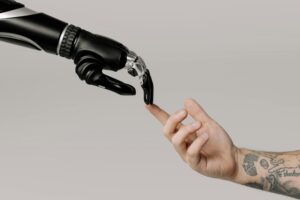 The Impact of AI on Society: A Transformative Force
The Impact of AI on Society: A Transformative Force
Artificial Intelligence (AI) is revolutionizing how we live and work. For instance, virtual assistants on our phones and advanced medical diagnostic systems are just a few examples of how AI is driving a global transformation. In this blog, we’ll explore how AI affects various aspects of our society and what this shift means for the future.
Introduction: What is Artificial Intelligence?
Artificial Intelligence refers to the simulation of human intelligence processes by computational systems. Specifically, this includes tasks such as machine learning, natural language processing, and decision-making. As technology advances, AI becomes increasingly sophisticated and integral to our daily lives.
Impact on the Workforce
Automating Repetitive Tasks
AI automates repetitive and mundane tasks across many industries. For example, in fields ranging from manufacturing to administration, automated systems now handle jobs that humans used to perform. Although this boosts efficiency, it also raises important questions about the future of employment.
Creating New Roles and Opportunities
While AI eliminates some jobs, it simultaneously creates new ones. Companies increasingly seek AI experts, software developers, and data analysts. Consequently, these roles offer fresh employment opportunities and require advanced technical skills.
Changes in Education and Training
Personalizing Learning
AI enables a more personalized education by tailoring content and teaching methods to individual students’ needs. As a result, this personalization promises a more effective and accessible educational experience.
Training and Reskilling
Since AI is transforming many jobs, training and reskilling become essential. Consequently, educational institutions and companies are investing in programs designed to help workers adapt to the evolving job market.
Advances in Healthcare
Improving Diagnosis and Treatment
AI transforms healthcare in significant ways. For instance, it analyzes medical images, predicts disease outbreaks, and recommends personalized treatments. Thus, this improvement in diagnostic accuracy enhances both the accessibility and efficiency of treatments.
Boosting Research and Development
Moreover, AI accelerates medical research by identifying new study areas and developing new medications. Researchers can now analyze large volumes of data quickly, which revolutionizes scientific discovery.
Ethical and Social Challenges
Addressing Privacy and Security
The rise of AI brings notable concerns about data privacy and security. Collecting vast amounts of personal information, for example, poses significant risks. Therefore, managing these risks through appropriate policies and practices is crucial.
Combating Bias and Discrimination
Furthermore, AI systems can perpetuate or amplify existing biases if designers do not address these issues carefully. Ensuring fair and equitable AI use is crucial to avoid reinforcing discrimination.
The Future of AI: Opportunities and Risks
Driving Continued Innovation
The field of AI evolves rapidly, and innovations promise further changes to our way of life. For instance, advancements in robotics and general AI offer exciting potential developments.
Establishing Regulation and Governance
To maximize AI’s benefits and minimize risks, effective regulatory and governance frameworks are necessary. Therefore, governments, businesses, and citizens must collaborate to create a safe and ethical environment for AI to thrive.
Conclusion
In summary, Artificial Intelligence profoundly impacts our society, transforming work, education, and healthcare, among other areas. While the benefits are significant, it is essential to remain aware of the challenges. By working together, we can ensure the ethical and beneficial use of this technology. As we move toward a future driven by AI, staying informed and prepared for upcoming changes is crucial.


